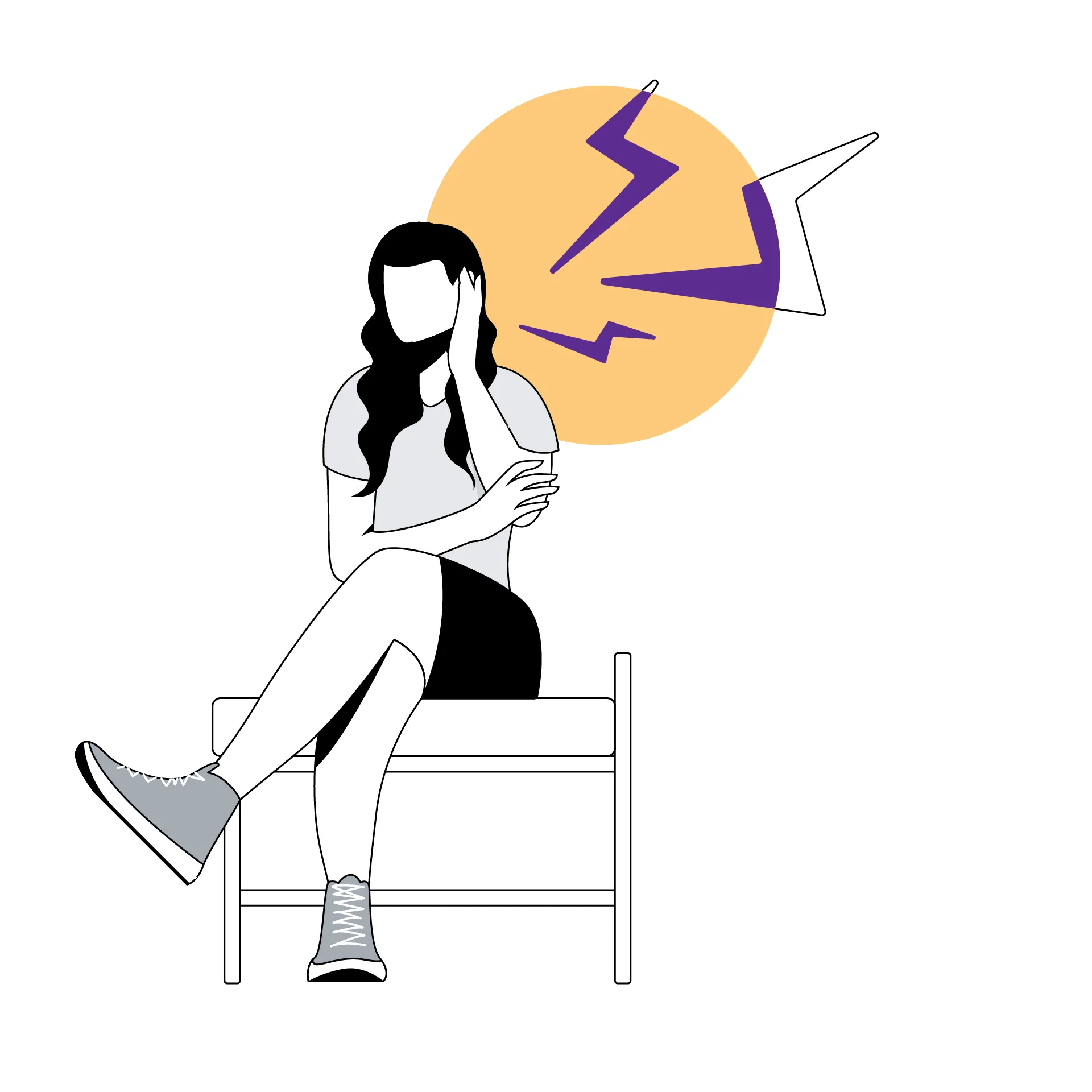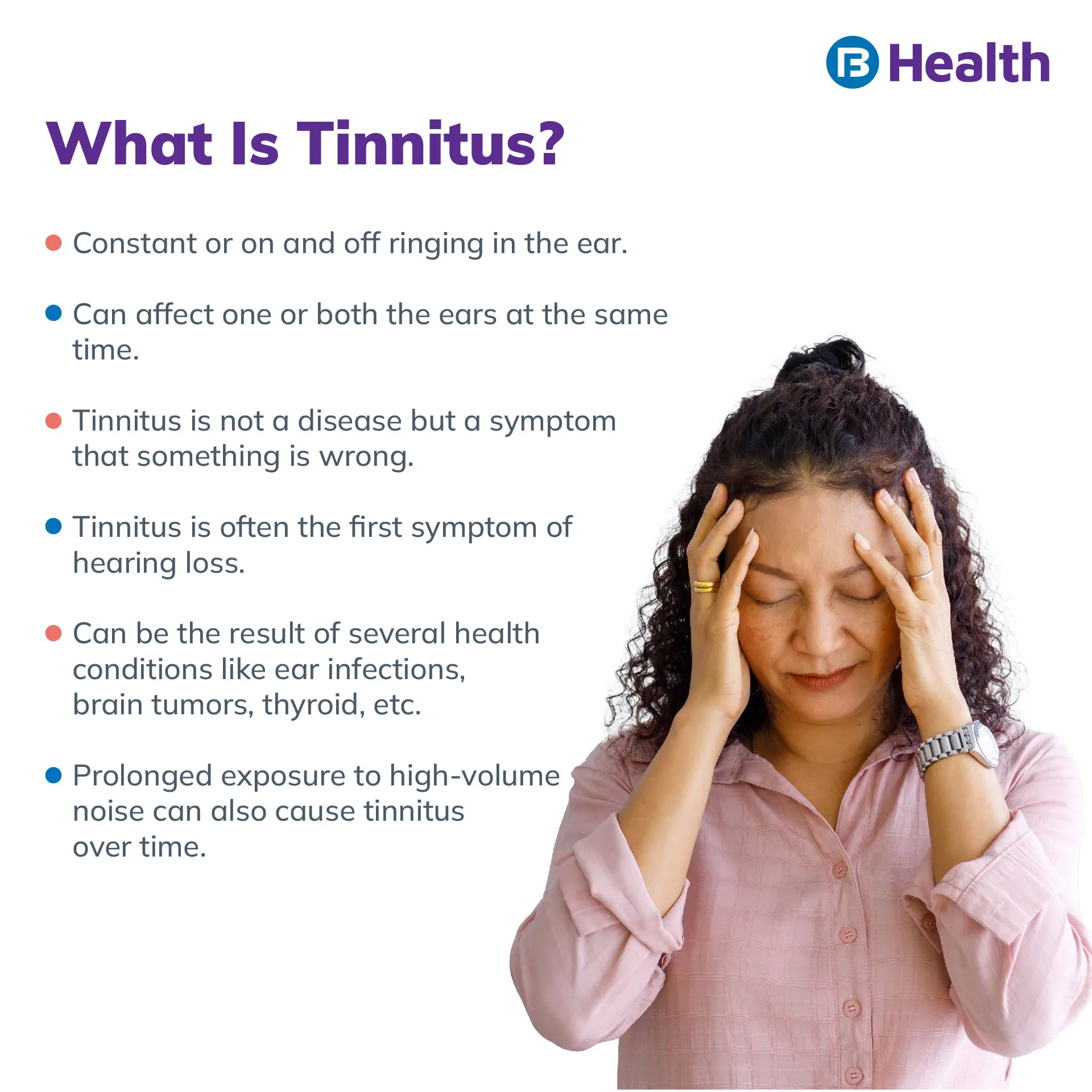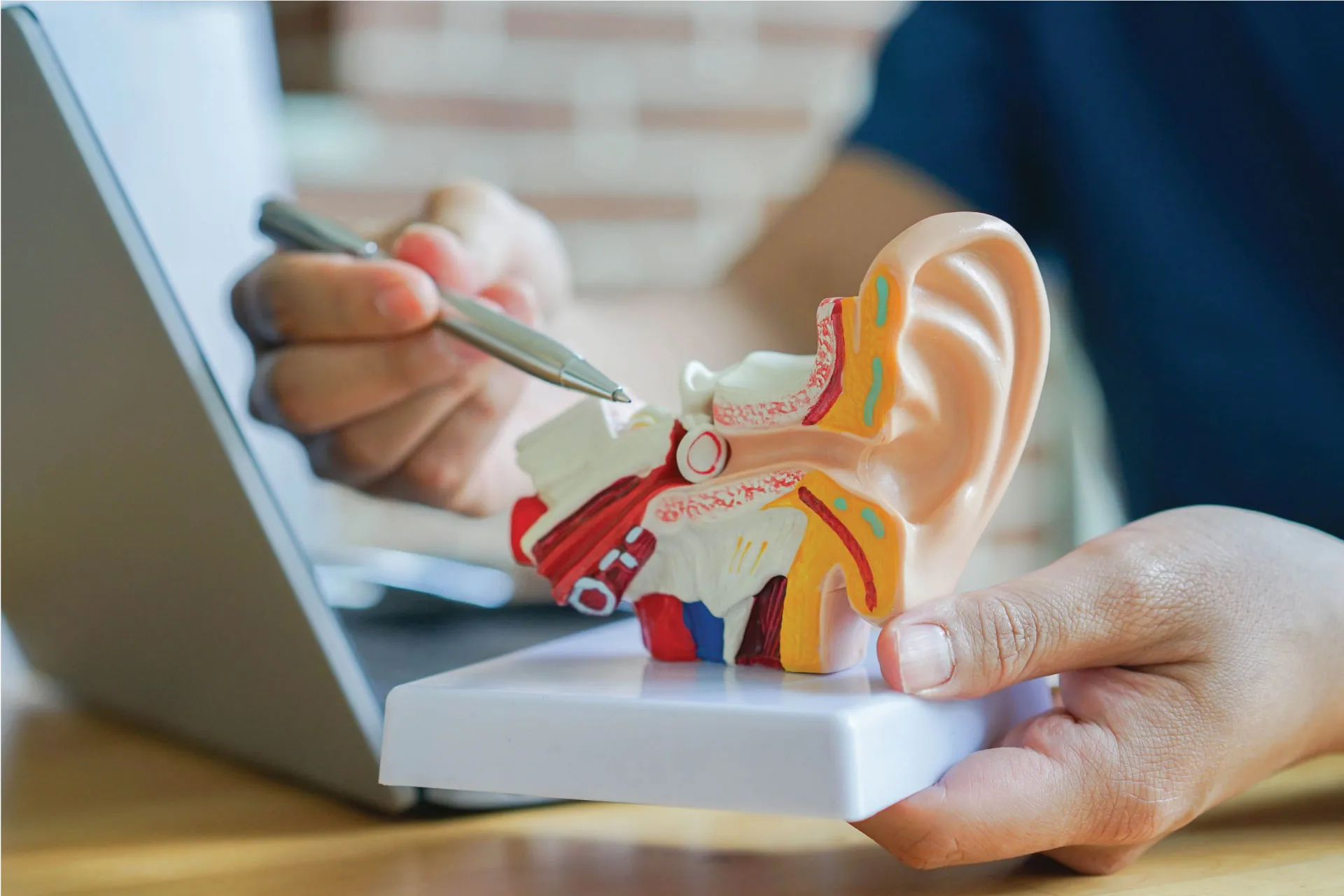ENT | 7 min read
Tinnitus: Definition, Causes, Symptoms and Diagnosis
Medically reviewed by
Table of Content
Synopsis
Tinnitus is a common symptom, affecting about 15% to 20% of people, and is significantly more common in older people. Tinnitus is mostly linked with hearing loss, but the disease itself does not cause hearing loss, nor does loss of hearing cause tinnitus.
Key Takeaways
- Tinnitus is not a serious health condition but can impact normal life
- It affects older adults and people who work in a loud environment
- Tinnitus does not have any permanent cure, but it can be managed
What Is Tinnitus?
Tinnitus is a medical condition affecting thousands and millions of people worldwide. It can cause a broad range of symptoms, which includes ringing, buzzing, humming, and whistling in the ears. These sounds are usually not from the outside source but rather from within the head. The symptoms can be sporadic or can linger for a prolonged period. Depending on its strength, the symptoms can be weak or strong. It is sometimes unbearable at night in a quiet room where you are trying to fall asleep or if the background noise is low. If your tinnitus symptoms are severe, they can interfere with your daily activities. Having to put up with the symptoms daily can cause mental affliction and eventually lead to a breakdown.
Some of the tinnitus causes are often underlying medical conditions like blockage or infections in the ear that can lead to tinnitus. You can completely cure it once the underlying disease has been treated. But it often continues to exist even after the other illness is healed.

Tinnitus Causes
Healthcare professionals are still unsure of what causes tinnitus. However, it is perceived that abnormal brain activity that processes sound plays a role in creating tinnitus. It is most common in older adults, it typically develops gradually over time, but in some cases, it can occur suddenly too.
- Extended exposure to loud noises such as music or if your work involves working with noisy equipment and not taking preventive methods like safety ear muffs can increase your chance of tinnitus. A single incident can also lead to it if you are exposed to loud sounds. The cells in the cochlea suffer permanent damage from loud noises leading to lasting hearing loss.
- Hearing loss due to aging (Presbycusis) - occurs in approximately 1 in 3 people over 65.
- Due to a buildup of cerumen, a condition where excess earwax is buildup, a blockage occurs in the ear or other external objects like headphones buds or cheap cotton swabs lodged in the ear cause the eardrums to be damaged.
- Meniere's disease is a chronic ear condition that causes hearing loss and affects your balance (Vertigo).
- Various medication- anti-inflammatories medications, painkillers like aspirin, some types of antibiotics, anti-depressants, and ototoxic medications have had a history of carrying the side effect which causes tinnitus.
- Otosclerosis- A disease where the middle ear bone suffers growth and stiffening, impeding its ability to move freely and resulting in hearing loss.
- Various other medical conditions include cardiovascular diseases, allergies (When the eustachian tube is affected because of congestion), autoimmune diseases, tonsillitis, and anemia (reduced red blood cell flow) can cause pulsatile tinnitus.
- Injuries to the head and neck.
- Temporomandibular joint disorder syndrome (TMJ) is a disease where the joint and muscle suffers irritation. One of the most common symptoms of TMJ is tinnitus.
- Vestibular Schwannoma or acoustic neuroma, a tumor usually non-cancerous, affects the nerves connecting your ears to your brain.
- In rare cases, a tumor in the ear can also cause tinnitus.
Some Other Causes of Tinnitus
Several things could worsen tinnitus if you are already diagnosed with tinnitus. Drinking alcohol can aggravate tinnitus symptoms; drinking in moderation or giving up on alcohol altogether is key. Tobacco smoking can also worsen tinnitus symptoms, and it is essential to quit smoking cigarettes to suppress the symptoms.
Other factors such as drinking caffeinated beverages and eating certain types of food can trigger tinnitus. Reasons for why specific food increase tinnitus is unclear as of yet. It can also benefit you by keeping stress at bay, as fatigue and stress also cause tinnitus.

Tinnitus Diagnosed
Usually, when you visit your doctor, you will be asked about your medical history, which will include questions about the medications you are on or took in the past before your ear problems. Make sure to keep a list of all the drugs you have taken in the past, and it should also include the supplements.
After that, your doctor will perform a hearing test using an audiogram, followed by a head and neck examination. Next, your doctor will look into your ears to check for raptures and other plains to the eyes damages. An ear infection or wax buildup could be the reason behind it, which is examined by looking inside your ears.
If you have pulsatile tinnitus, your doctor may use a stethoscope to hear the insides of your neck and head. In addition, you may undergo a Tympanometry test, where your doctor will examine how well your eardrums move with a handheld device that displays your performance in a tympanogram.
In some instances, your doctor may refer you to an ENT Surgeon or an audiologist, a specialist who performs varied types of hearing tests like Magnetic resonance imaging (MRI) and CT scans.
Can a Severe Underlying Disease Cause Tinnitus?
Although it is sporadic, tinnitus is sometimes a sign that you may have Glomus tympanicum. And sometimes, if it is accompanied by walking and balance troubles, it may indicate you have other underlying neurological conditions. Therefore, you may need to see your doctor immediately if you notice these symptoms.
Tinnitus Treatment
After running a diagnostic test, once the origin is identified, its treatment will depend on what caused your tinnitus.
If it was caused by excessive wax buildup in your ears, then your doctor will treat it by removing it. Or, if it's an ear infection, you can cure your tinnitus by treating your ear infection.
If it is caused by medication, your physician may suggest you discontinue your medication or change the drug. Always consult your doctor before taking or changing your medications, and never attempt to do it yourself.
Occasionally, if you are suffering from high blood pressure, the ringing in your ears could be increased. You can improve this by regulating your blood pressure.
What If You Don't Have Any Underlying Medical Conditions?
If you have no known medical conditions causing tinnitus, your healthcare provider might suggest methods to improve the tinnitus symptoms for better living.
Your online doctor consultation might also suggest other treatment methods to mitigate the symptoms:
- Hearing aids: If you are suffering from hearing loss, a hearing aid could assist you in hearing the sounds louder, which you usually can not hear.
- Generating sounds: This treatment includes muffling the external sounds by wearing headphones, listening to calming music of your choice, and listening to white noises. You may also get some good night's sleep by playing white noise machine near your bed.
- Retraining therapy: In your counseling, you might be advised to wear a headgear that produces tonal music, which can muffle the ringing noise.
- Make your jam: You know yourself better than no other. Find out what soothes you and create tinnitus masking techniques that work best for you.
- Exercises that promote relaxation: It ringing can take a toll on you and frustrate you, try out methods to relax. You can do a range of things to calm yourself, from yoga to biofeedback. And remember to get daily exercise and to practice a healthy lifestyle.
- Cognitive Behavioral Therapy: Also known as CBT, is a therapy to help change the way you perceive tinnitus. A method of therapy to train your brain to notice the tinnitus ringing less.
- Medications: Thankfully, some medicines have been proven to improve its symptoms, which include topical anesthetics, medications to curb anxiety, and certain hormonal medications.
Is It Possible to Get Rid of Tinnitus Completely?
Healthcare providers are constantly working to find a permanent cure for tinnitus, but as of now, treating the underlying cause and a lifestyle change to minimize the tinnitus impact on your life.
It is a common problem affecting millions of adults; significantly more common in older adults. Although tinnitus isn't a life-threatening condition, it can affect the quality of your life. There is no known cure for tinnitus, but it can effectively be suppressed, and reducing the severity can improve its condition. If you want to protect yourself from any disease, you can avail of health insurance plan.
References
Disclaimer
Please note that this article is solely meant for informational purposes and Bajaj Finserv Health Limited (“BFHL”) does not shoulder any responsibility of the views/advice/information expressed/given by the writer/reviewer/originator. This article should not be considered as a substitute for any medical advice, diagnosis or treatment. Always consult with your trusted physician/qualified healthcare professional to evaluate your medical condition. The above article has been reviewed by a qualified doctor and BFHL is not responsible for any damages for any information or services provided by any third party.





